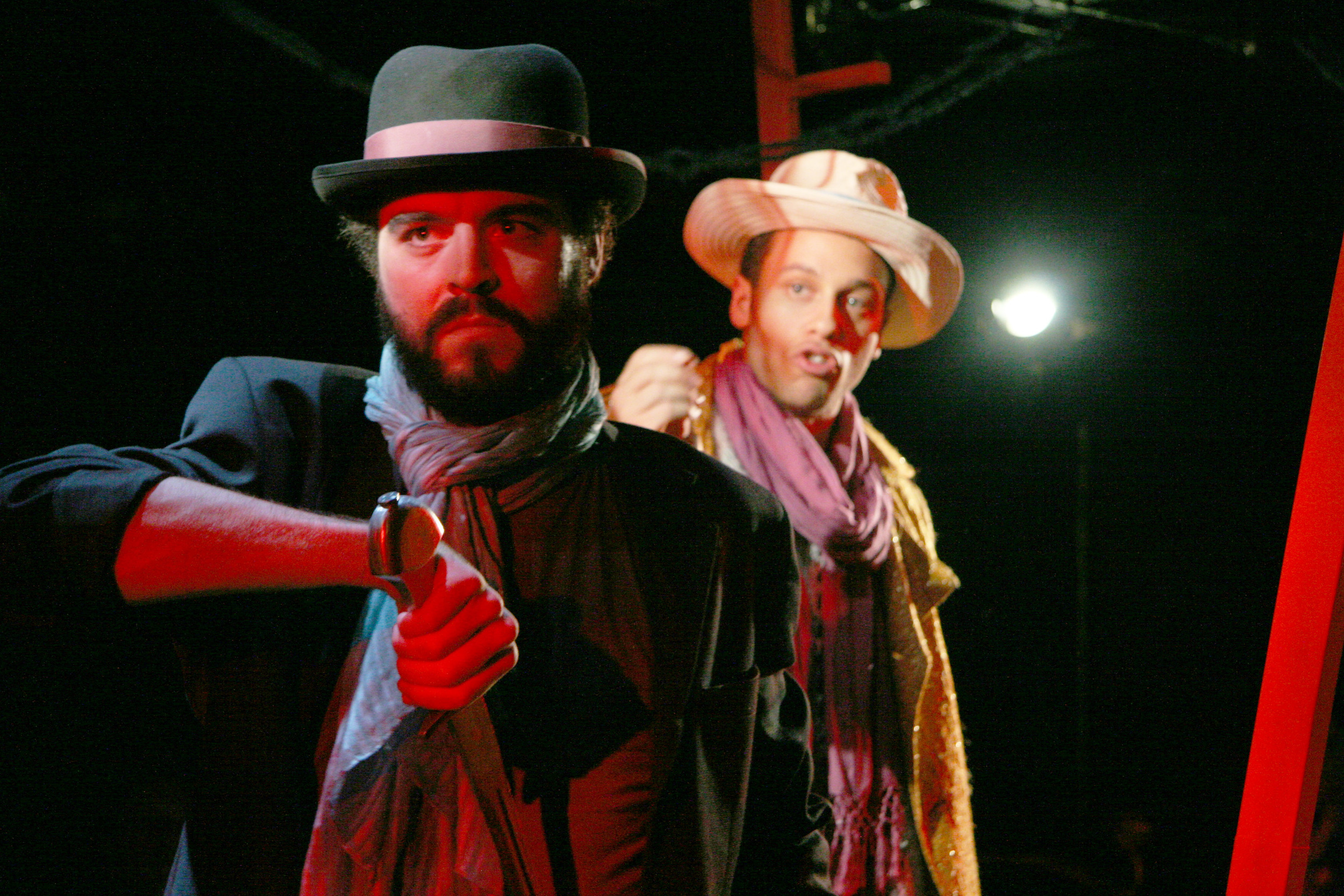The blues make you feel better, but what if you’re dying? That, we might say, is the test underlying the Yale Cabaret’s latest offering: Ain’t Gonna Make It, conceived by Nicholas Hussong, Cole Lewis, Masha Tsimring, and Lauren Dubowski, directed by Lewis, and created by the Ensemble, which consisted of Eric, the dying man (Timothy Hassler), the dour Balloon Man (Ryan Campbell), and a band: Hansol Jung, Martha Jane Kaufman, Sarah Krasnow, Jenny Schmidt, and Lico Whitfield. The play is presented in true Cabaret style—a man at a microphone, with a guitar, regaling us with songs and anecdotes about how he learned of his condition—colon cancer—and found out that, at the age of 29, his life was over. It’s Hassler’s show all the way, and he delivers the part with a dynamism that keeps the audience enthralled. The style is loose enough to make us feel at times he’s actually talking to us, rather than simply acting out a scripted play—and that’s helped by certain moments of audience interaction that not only erase the space between audience and actor, but make us aware of how we’re responding to Eric’s plight.
Addressing an audience member as if on a date in hopes of a “sympathy fuck” (the theme of a rather vehement song moments before), then taking her hand and moving it in a very suggestive way, or kneeling before a male audience member to play on a recorder—sheepishly allowing “I’ve never done this before”—or placing one of his balloons in the arms of “Mom” while trying to tell her of his condition, Hassler creates moments of tension that entertain us but that also keep us uneasy with the dimensions of his story. It’s a tightrope walk of considerable skill—not only to play a dying character who is spilling his guts, but who is also trying to be an “act” and to get us into the act. Hassler, lean, fair-haired, ingratiating, has a boy-next-door look that makes his experience seem generalizable. When he reflects on all the things he won’t do, it’s a sobering moment about the kinds of denials for the future that we tend to ask of twenty-somethings. And if there’s no future?
One of the best bits is a foot-stomping song, mostly a capella, in which Eric exhorts himself to “take the pill”—big medical vials are situated within easy reach as he pill-pops his way through different moods—and Hassler finds the groove to take it on home. In general the songs show how versatile the blues are as a form, with sadness, anger, horniness, and consolatory clarity giving us various sides of the situation. One particularly effective number used Sarah Krasnow on keening backing vocals to great effect—a kind of mournful gypsy tune with a lot of soul.
As the baleful Balloon Man, Ryan Campbell’s erratic, silent appearances are unnerving. Handing over a balloon to Eric, or dropping a load of them on the floor, his acts and the balloons remind us of the cancer cells proliferating in Eric’s system—in one upbeat moment, two nurses (Sarah Krasnow and Jenny Schmidt) tap-dance to lively music and fling balloons out the window. Yet nothing can deplete all the balloons.
One might think the show—which ends with the loudest balloon burst I’ve ever heard—would be a downer in its one-way path to our hero’s extinction. It’s not, because the show not only affirms life, it embraces death with gutsy emotion rather than sentimental gestures. As a form of soliloquy—the one we will all face at some time, alone with our various ends—it makes us contemplate the dignity of the life of an individual, so present for us at one moment, so completely gone the next.
The Yale Cabaret will be dark next week, then return Oct. 18-20 with White Rabbit, Red Rabbit, by Nassim Soleimanpour, in which five actors—one for each performance—open a sealed envelope and enact the script inside. Audiences and actor discover together what the play is.
More about the rest of the first half of the Cabaret's season 45 to come.
Ain’t Gonna Make It Conceived by Nicholas Hussong, Cole Lewis, Masha Tsimring, and Lauren Dubowski Directed by Cole Lewis Created by The Ensemble
October 4-6, 2012 Yale Cabaret 45th Anniversary Season


